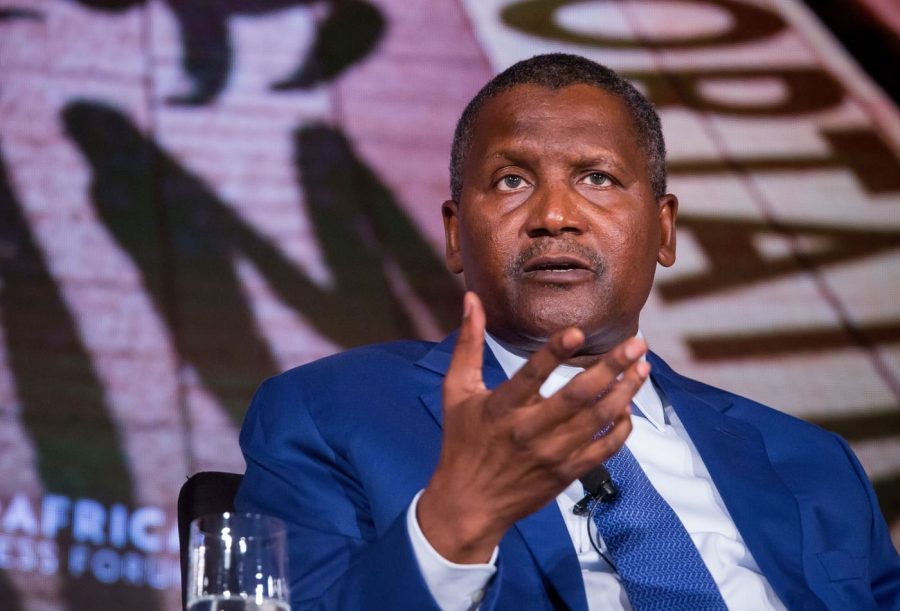MARKETS AND ECONOMY
Dangote: Nigerians Pay 55% Less for Petrol than other West Africans
Published
9 months agoon

The President of Dangote Group, Aliko Dangote, has revealed that Nigerians are currently paying just 55% of what their West African neighbours spend on petrol, thanks to local refining efforts at the Dangote Refinery.
Dangote made the disclosure during a visit to the 650,000-barrel-per-day refinery in Lagos by Dr. Omar Touray, President of the Economic Community of West African States (ECOWAS) Commission, and his delegation. According to a statement by the Dangote Group on Sunday, the visit aimed to showcase the facility’s capacity and its regional impact.
Read Also:
“In neighbouring countries, the average petrol price is around $1 per litre — that’s about ₦1,600 — but we’re selling between ₦815 and ₦820 per litre at the refinery. Most Nigerians don’t realise they are paying almost half of what others in the region are paying,” Dangote stated.
He credited the refinery’s operation for reducing fuel costs across Nigeria, noting that similar cost relief was recorded when the plant began diesel production last year. “We slashed diesel prices from ₦1,700 to ₦1,100 almost instantly, and prices have fallen further since then. This has supported various sectors — mining, manufacturing, and especially agriculture,” he added.
Dangote also emphasized the broader economic implications of the refinery, saying it helps cut down Nigeria’s import dependency and boosts self-reliance. “As long as we keep importing what we can produce, we will remain underdeveloped. This refinery proves we can build world-class infrastructure ourselves,” he said.
The industrialist dismissed concerns about the plant’s capacity to meet local and regional fuel demand. “There’s been talk that we can’t even satisfy Nigeria, so how can we supply others? But now, ECOWAS officials are here to see for themselves. This refinery is not just for Nigeria — it’s built for Africa.”
He disclosed that the company is planning a major new initiative yet to be announced and reiterated that the refinery was established to benefit Nigerians. “They should know this project is for them. They will enjoy the maximum benefit,” he said.
Responding to the tour, ECOWAS Commission President Dr. Omar Touray described the refinery as “a beacon of hope for Africa’s industrial future.” He called it an example of what is possible when the private sector is empowered to lead development.
“What I’ve seen here is beyond impressive. Anyone who doubts Africa’s potential should visit this place. This is what the continent needs — bold investments, long-term vision, and regional collaboration,” Touray said.
Touray also highlighted the refinery’s production of Euro V-grade fuel, meeting ECOWAS’s 50 parts per million (ppm) sulphur specification — a benchmark many imported fuels fail to meet, posing public health and environmental risks.
“We are still importing substandard fuels while a regional company like Dangote is producing cleaner, high-quality products. The private sector must drive ECOWAS industrialisation,” Touray asserted.
He urged policymakers to deepen collaboration with industrial players and avoid making economic decisions from a distance. “This visit is a listening mission. We want to know what the private sector expects from ECOWAS so we can better align our policies,” he said.
Touray pledged the commission’s support in opening up the ECOWAS market to Dangote and similar regional champions. “We are committed to ensuring this refinery — and others like it — can access all ECOWAS markets, and even beyond, into the wider African continent.”
The ECOWAS delegation included Commissioner for Infrastructure, Energy and Digitalisation, Sediko Douka; Commissioner of Internal Services, Prof. Nazifi Darma; Director of Private Sector/SME, Dr. Tony Elumelu; and Chief of Staff to the ECOWAS President, Abdou Kolley.
Share this:
- Click to share on X (Opens in new window) X
- Click to share on Facebook (Opens in new window) Facebook
- Click to share on WhatsApp (Opens in new window) WhatsApp
- Click to share on Pocket (Opens in new window) Pocket
- Click to share on Telegram (Opens in new window) Telegram
- Click to email a link to a friend (Opens in new window) Email
- Click to share on LinkedIn (Opens in new window) LinkedIn
You may like


NCC Committed to Regional Digital Integration – Maida


Eyes on Dangote for the Next Capital Market Boom


Easy Transport, 50% Credit: Dangote Toughens Strategy to Strangle Fuel Import


Dangote Refinery Slashes Petrol Price to N867


We Have Over N600bn Worth of Petrol in Store ― Dangote


Dangote Refinery Retained 13% of Nigeria’s Crude Exports – Report












